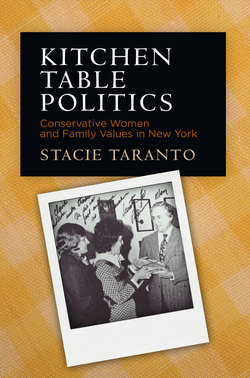Читать книгу Kitchen Table Politics - Stacie Taranto - Страница 8
На сайте Литреса книга снята с продажи.
ОглавлениеNOTE ON TERMS
Certain key terms and organizing principles appear throughout the book. The movements, groups, and participants they refer to were not as homogeneous as the blanket terminology used to describe them suggests. The term “New York” refers to New York State, not New York City, which is labeled as such. Derivations of “pro-family” or “family values” were used for convenience. Unless otherwise noted, references to “feminists” relate to (white) liberal, as opposed to radical, feminism because liberal feminists from organizations such as the National Organization for Women were more immersed in the electoral political arena covered here. Liberal feminists offended the first-generation suburban homemakers at the center of this narrative, as women of a similar racial and class demographic who were supposed to be their friends and neighbors, not political adversaries.
Perhaps no issue is more volatile than debates over whether abortion should be legal, which necessitated a careful parsing of words. Opponents of legal abortion are labeled as “anti-abortion.” This term does not imply that advocates of legal abortion were necessarily “pro-abortion.” Proponents advocated abortion’s legality; few took the actual procedure lightly. The more politicized “pro-life” and “pro-choice” descriptors appear only in quotations from activists. Opponents of legal abortion chose the term “pro-life” to reflect their belief that unborn fetuses were akin to, and thus should be afforded the same legal rights as, those living outside the womb. Proponents of legal abortion, particularly feminists, saw legal abortion as a fundamental right—a decision that only a woman, whose body and life were directly affected by pregnancy, should make, as the “pro-choice” marker denotes. These terms reflect two very different outlooks on abortion, the origins of which unfold here.
